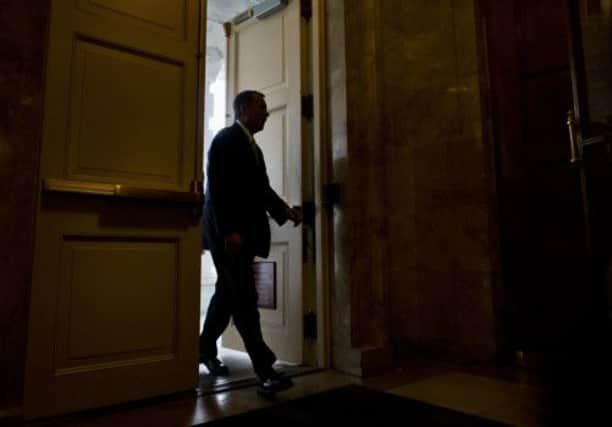Door opens on possible deal to end US shutdown


Mr Ryan, the Republican chairman of the House budget committee, and President Barack Obama met to discuss ways a bitterly divided Congress might move towards an agreement.
Senior Republicans welcomed the “friendly” discussion, but no deal was struck or even proposed to end the 12-day impasse.
Advertisement
Hide AdAdvertisement
Hide AdSince 1 October, hundreds of thousands of federal employees have been kept from their jobs, national parks and monuments have remained closed and analysts have warned of a looming financial disaster over the failure of Congress to extend the government’s debt ceiling.
Eric Cantor, the House majority leader, said the meeting was “very useful” while Florida Congressman Steve Southerland said the respectful relationship between Mr Obama and Mr Ryan, old foes from the campaign trail a year ago, had helped dampen hostility between the parties.
“Paul and the president certainly have a pass through the last election and I think there’s a great respect between them. And you can’t make that up,” he said. “The communication between Paul and the president, I think, was an important part of the conversation.”
Sources said Mr Obama stood firm on his refusal to negotiate with Republicans while the government was shut down, and Mr Ryan reiterated his party’s stance that a resolution should be tied to changes to the president’s flagship “Obamacare” health reforms.
But several people who were at the meeting said the tone was conciliatory, with both sides agreeing to talk to senior figures in their own parties to discuss possible areas of compromise.
Republicans proposed a short-term deal between the House of Representatives, which they control, and the Democrat-dominated Senate that would temporarily lift the government debt limit, although it lacked Mr Obama’s key demand of an end to the shutdown first.
If no agreement is in place by next Thursday, Treasury chiefs say the US would be likely to default on its financial obligations to other nations for the first time.
Mr Ryan’s moderate approach was in stark contrast to that of right-wing Republican senator Ted Cruz, the de-facto leader of conservatives who are digging in against Obamacare.
Advertisement
Hide AdAdvertisement
Hide Ad“In my view, the House of Representatives needs to keep doing what they’re doing, which is keeping strong,” he said at a summit in Washington after Speaker John Boehner’s refusal to allow a vote on any proposal that would agree a budget and re-open the government without it being linked to Obamacare.
Mr Cruz said: “We’re nearing the edge of a cliff. What does it take to win this fight?”
Mr Ryan, in a video message to the same conservative summit, warned Republicans they could not expect to get things entirely their own way. “This president won’t agree to everything we need to do,” he said. “A budget agreement with this president and this Senate won’t solve our problems, but I hope it’s a start.”
Senate leaders from both parties met separately with Mr Obama at the White House yesterday to discuss that chamber’s proposals to end the stalemate. Harry Reid, the majority leader, has not indicated when senators might vote on a measure that would agree a debt-ceiling extension, fund the re-opening of government departments and allow some minor concessions on Obamacare. However, those concessions would probably mean the measure being defeated.
With the country going into a second weekend with its government still shut down, polls suggest citizens are weary of the bickering and most would vote to defeat and replace every single member of Congress.